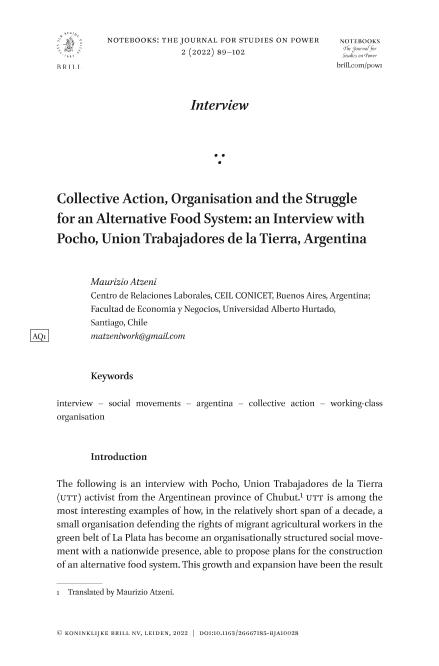Mostrar el registro sencillo del ítem
dc.contributor.author
Atzeni, Maurizio

dc.date.available
2023-07-21T19:04:18Z
dc.date.issued
2022-12
dc.identifier.citation
Atzeni, Maurizio; Collective Action, Organisation and the Struggle for an Alternative Food System: An Interview with Pocho, Union Trabajadores de la Tierra, Argentina; Brill Academic Publishers; Notebooks: The Journal for Studies on Power; 2; 1; 12-2022; 89-102
dc.identifier.issn
2666-7177
dc.identifier.uri
http://hdl.handle.net/11336/204869
dc.description.abstract
The following is an interview with Pocho, Union Trabajadores de la Tierra (utt) activist from the Argentinean province of Chubut.1 utt is among the most interesting examples of how, in the relatively short span of a decade, a small organisation defending the rights of migrant agricultural workers in the green belt of La Plata has become an organisationally structured social movement with a nationwide presence, able to propose plans for the construction of an alternative food system. This growth and expansion have been the result not of a strategy planned at headquarters level but rather a consensus-based social struggle driven by the immediate interests of the agricultural workers involved. Echoing what Pocho says in the interview, the economistic dimension of the struggle has been and continues to be at the core of utt struggles, despite the national relevance and impact of mobilisation events such as the verdurazo.2 In a similar way, the alternative system of food production and distribution put into practice by utt with the agro-toxin-free colonias agricolas, or the network of popular fruit and vegetable shops (almacenes populares), while addressing the interests of the working class as a whole and directly intervening in the sphere of public policies, emerged initially as political tools and proposals around which to articulate the everyday struggles of agricultural producers to improve their lives. This bottom-up, workers-based construction of a social movement, and thus the way in which labour-related conditions of exploitation, rather than just ecological motives, have structured the organisational building process of utt, are important considerations when reflecting on broader issues of working-class organisation around the world.
dc.format
application/pdf
dc.language.iso
eng
dc.publisher
Brill Academic Publishers

dc.rights
info:eu-repo/semantics/openAccess
dc.rights.uri
https://creativecommons.org/licenses/by-nc-sa/2.5/ar/
dc.subject
Entrevista argentina
dc.subject
Movimientos sociales
dc.subject
Acción colectiva
dc.subject.classification
Otras Sociología

dc.subject.classification
Sociología

dc.subject.classification
CIENCIAS SOCIALES

dc.title
Collective Action, Organisation and the Struggle for an Alternative Food System: An Interview with Pocho, Union Trabajadores de la Tierra, Argentina
dc.type
info:eu-repo/semantics/article
dc.type
info:ar-repo/semantics/artículo
dc.type
info:eu-repo/semantics/publishedVersion
dc.date.updated
2023-06-30T13:13:56Z
dc.identifier.eissn
2666-7185
dc.journal.volume
2
dc.journal.number
1
dc.journal.pagination
89-102
dc.journal.pais
Países Bajos

dc.journal.ciudad
Leiden
dc.description.fil
Fil: Atzeni, Maurizio. Consejo Nacional de Investigaciones Científicas y Técnicas. Oficina de Coordinación Administrativa Saavedra 15. Centro de Estudios e Investigaciones Laborales; Argentina
dc.journal.title
Notebooks: The Journal for Studies on Power
dc.relation.alternativeid
info:eu-repo/semantics/altIdentifier/url/https://brill.com/view/journals/powr/2/1/article-p89_007.xml?ebody=full%20html-copy1
Archivos asociados
